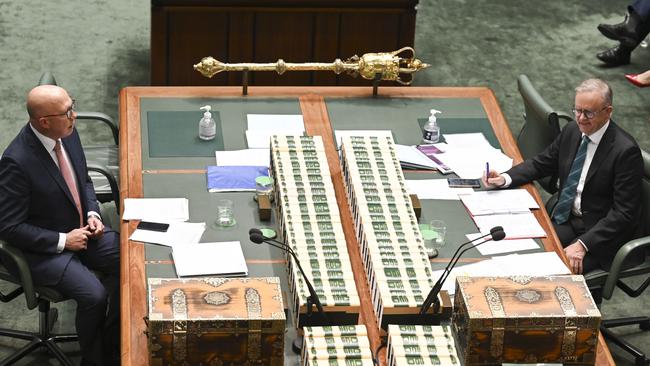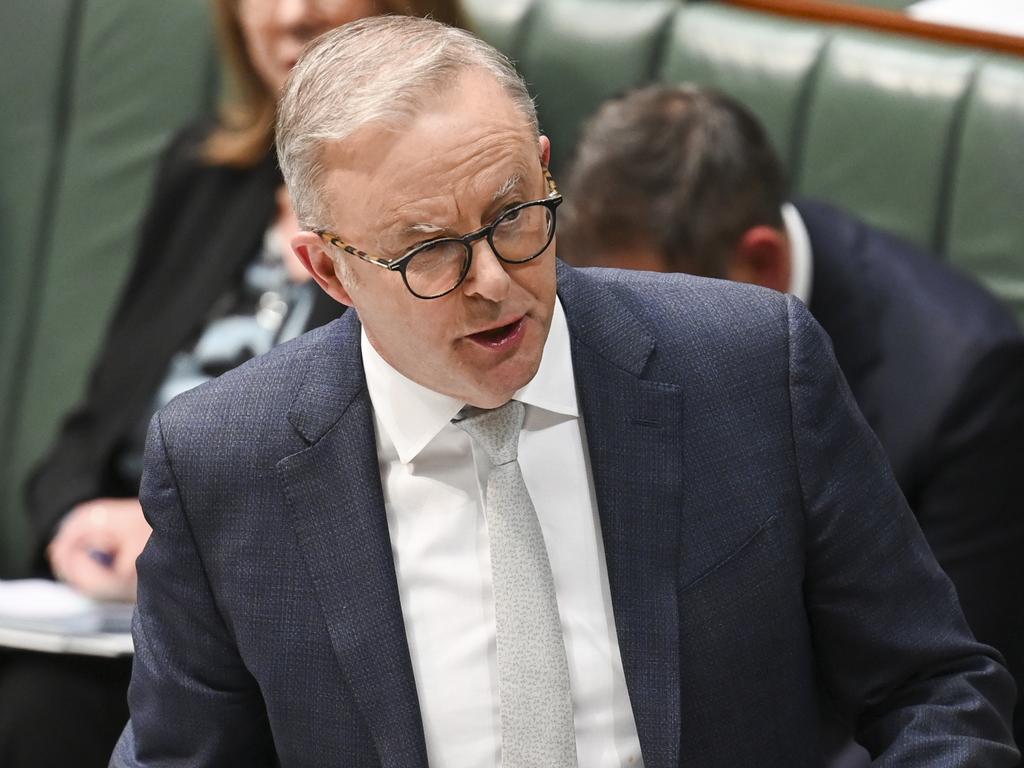Newspoll: Support for Coalition and Labor falls as nuclear debate divides along party lines
Primary support for the Coalition and Labor has fallen following the release of Peter Dutton’s nuclear power strategy, with the community almost evenly split over the plan.

Primary support for the Coalition and Labor has fallen following a bitter row over energy and climate change policy sparked by the release of Peter Dutton’s nuclear power strategy, with the community almost evenly split over the Liberal leader’s plan.
An exclusive Newspoll conducted for The Australian shows the primary vote for the Coalition falling sharply by three points to 36 per cent over the past three weeks with Labor dropping a point to 32 per cent.
Both Anthony Albanese and Mr Dutton have also returned to near-record levels of dissatisfaction with voters for both leaders this term.
The decline in support for both major parties has yielded a rebound in support for the Greens and independents, pointing to a rerun of the last election with historically low levels of primary vote support for Labor and the Liberal/Nationals parties.
The Newspoll showed voters virtually evenly divided over Mr Dutton’s nuclear energy plan, following his nomination of seven regional sites around the country for nuclear plants to replace retiring coal-fired power plants beyond the mid-2030s.
A total of 42 per cent of voters said they approved when asked their opinion of Mr Dutton’s plans to build nuclear reactors in Australia on seven sites of current and former coal-fired power stations before 2050, if elected.
This compared to 45 per cent who said they disapproved of the plan, with 13 per cent of voters having yet to form an opinion.
Women were the strongest opponents at just 32 per cent approving of the policy.
The level of support was highest among Coalition voters at 69 per cent compared to 23 per cent of Labor voters and 19 per cent of Greens voters.
There was a significant divide among men and women, with a majority of male voters backing the plan (54 per cent) but 51 per cent of female voters disapproving.
Older voters were also more supportive compared with younger voters, with those in the middle-aged brackets more closely divided on the issue.
The policy has ignited a bitter partisan contest, with the Albanese government accused of engaging in a scaremongering campaign to undermine the safety of a civil nuclear power industry, despite Labor having committed to nuclear powered submarines.
The four-point fall in overall support for the major parties continues the trend towards a possible minority Labor government if results were replicated at an election.
The Newspoll results suggest that the nuclear announcement may have cost the Coalition votes, while support for Labor also dropped amid a torrid week for the government, including worse than expected inflation numbers and division within its ranks following Labor senator Fatima Payman crossing the floor to support a Greens’ motion demanding recognition of Palestinian statehood.
A partisan divide also emerged between the Coalition and Labor over the release of Julian Assange following a plea deal with the US to avoid facing trial over American espionage charges.
On a two-party-preferred basis, Labor improved its position to lead the Liberal/Nationals Coalition 51-49, compared to the 50-50 recorded in the previous Newspoll three weeks ago.
The Greens vote lifted two points to 13 per cent, its highest level of support since the election.
Pauline Hanson’s One Nation Party remained stable at 7 per cent, and other minor parties and independents, including the teal independents, rose two points to 12 per cent.
Both the Prime Minister and Mr Dutton suffered falls in their net approval ratings, with the Mr Albanese and the Opposition Leader firmly in negative territory.
Only a small margin separates the two when voters were asked to consider who they would prefer as prime minister.
Mr Albanese’s approval fell a point to 42 per cent while dissatisfaction with his performance rose three points to 53 per cent.
This was the second highest level of dissatisfaction since he was elected.
Mr Dutton’s approval rating fell a point to 38 per cent but those dissatisfied rose five points to 54 per cent.
Mr Albanese’s net approval rating of minus 11 was two points higher than his worst result of minus 13 following the failed voice referendum.
Mr Dutton’s net approval of minus 16 was also not as low as the minus 20 he recorded in September last year.
The contest over who voters believed would make the better prime minister was unchanged at 46 per cent to 38 per cent in Mr Albanese’s favour. This is the tightest margin between the two leaders since the last election.
The decline in primary vote support for both the Coalition and Labor returns their combined primary vote to just 68 per cent, with almost a third of voters nominating minor parties or independents as their first preference ahead of the major parties.
This is an almost identical split to the May 2022 election when comparing the primary vote for the major parties to others, which resulted in Labor being elected on its lowest ever primary vote and the Coalition falling to its worst showing at an election. Labor won the election with a majority of two seats on a two-party-preferred vote of 52.1-47.9 per cent.
This survey was conducted between June 24 and June 28 with 1260 voters throughout Australia interviewed online.







To join the conversation, please log in. Don't have an account? Register
Join the conversation, you are commenting as Logout